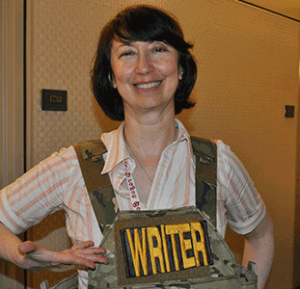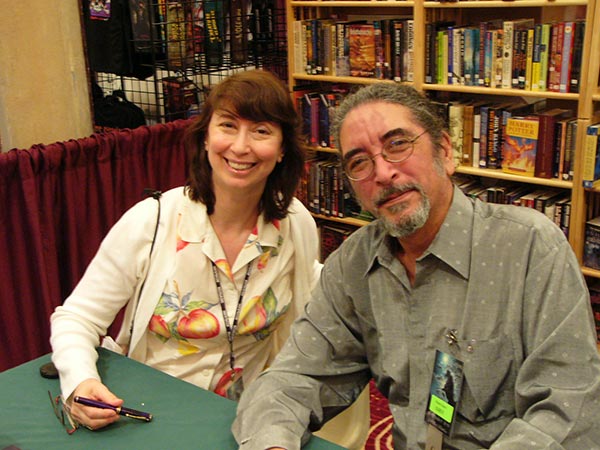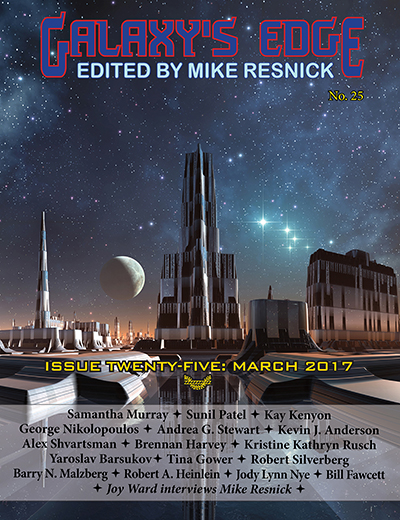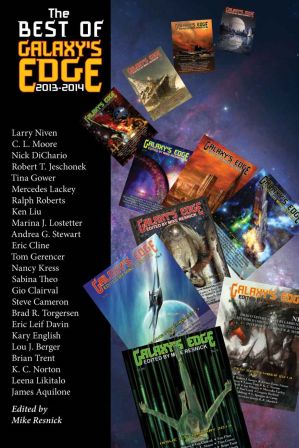By Carl Slaughter: Humor author Jody Nye has way too much fun. So do the authors she hangs out with.
CARL SLAUGHTER: Why do you write primarily humor?
JODY LYNN NYE: I enjoy it. I love a book that makes me laugh out loud, or even chuckle knowingly. There’s so much out in the real world that is depressing that I want to help lift people’s spirits. If I can help by being the anodyne to the evening news, I will consider my job well done. From the responses I’ve had from readers, they enjoy it. The books I reach for are primarily ones that examine a situation wisely, but with a kind heart behind it. Terry Pratchett, Robert Asprin, and Mark Twain all had a hand in forming my point of view, and they were masters at what I practice. You can make hard truths palatable if you make people laugh while you’re stating them, but pure entertainment is also a noble cause.
CS: What makes good humor?
JLN: The easiest way to look at humor is to take an ordinary situation, but put a twist in it. (A very quick example is a commercial on television right now, where a man behind a desk is explaining his business, but an adorable two-year-old is asking, as two-year-olds do, “Why?” “Why?” “Why?” after every explanation, so he keeps going. At last, he clearly feels that he’s done enough catering to a two-year-old, and glances toward the mother, who scolds him. “These are important questions!” she insists.) Elevate the lowly, bring the lofty down a peg, make the unimportant vital. There’s a saying that humor is tragedy plus time, but I believe it’s also defined as tragedy plus distance. (i.e., “The Ballad of Harry Lewis,” by Allan Sherman.) Exaggeration is another factor. As Mel Brooks says, “If I get a papercut on my finger, that’s a tragedy. If you fall down a manhole and die, that’s comedy.” Most good humor is brief, so you need a good story to base the funny moments upon. Humor should never punch down.
CS: How do you mix humor and speculative?
JLN: Like tragedy or drama, humor can enhance a story. Read any science article while keeping an ironic point of view, and almost anything can sound absurd. Take the ravings of a clear crank seriously, and you also have humor. In my Lord Thomas Kinago space opera series, maintaining humankind’s genetic structure is vital, but it has the unintended consequence of allowing the otherwise useless nobility to keep existing. The humorous SF detective stories I write for Alex Shvartsman’s Unidentified Funny Objects anthology series feature a detective sergeant having to allow the implantation into her abdomen of a symbiotic alien as an extreme form of witness protection. Each story also has a further SF twist to otherwise ordinary objects, rendering such things as contact lenses and a swimming pool as murder weapons.
CS: How did you hook up with Anne McCaffrey and what type of relationship did you have with her?
JLN: Anne had licensed the Pern universe to Mayfair Games for the Dragonriders of Pern role play game. My husband, then fiancè, was one of the partners who owned Mayfair. I wrote game materials for them. Bill created two series of choose-your-own adventures set in licensed fictional worlds, the Crossroads individual adventures for TOR Books and the Combat Command military adventures for Ace. Because I wrote game materials for Mayfair (I had been playing D&D since 1976) and I could write fiction, I ended up penning two Crossroads game novels set on Pern, and Anne’s son Todd, wrote a Combat Command set in David Drake’s Hammer’s Slammers series. I met Anne at Norwescon that year to go over the proposed plot of the first one, Dragonharper (yes, I know Todd has since written a Pern novel called Dragon Harper.) and explain how a chosen-path story works. Since Dragonharper was going to be about young Journeyman Harper Robinton (later Master Harper Robinton), I wrote a very short sample for her, which was called “Robinton Hits the Sauce.” Anne thought it was hilarious, and it explained game book structure to her. Anne adopted me as one of her large extended family. She told me, “You’re going to be writing official Pern fiction, and a lot of people might be jealous of you. You can tell them, “Oh, that Anne McCaffrey! She’s so hard to deal with! I’ll never work with her again!” Or, you can tell them you’re my daughter.” She was always encouraging and otherwise wonderful and welcoming. I’ll always miss her.
CS: How did you hook up with Robert Asprin and what type of relationship did you have with him?
JLN: Bob was one of my husband Bill’s best friends. They knew each other long before I met either of them. When Bill and I were still engaged, we went to Ann Arbor, where Bob lived with his second wife, Lynn Abbey. They were so welcoming and kind that I felt I had known them for years. They introduced me to interests such as ice dancing and needlepoint. A lot of people pushed me and Bob to work together. Since we both wrote humor, of course. And we liked cats. And singing show tunes. We eyed each other dubiously, but when Bob hit a hard writer’s block after Phule’s Company hit the New York Times bestseller list (fear of success is a thing), Bill encouraged us to sit down and write something together that had nothing to do with any of our previous series.
Bob came up to our house, to Chicago in January, showing incredible faith in his friends, since our winters are not for sissies. Bill sat in the room as we began to outline the story, which later became License Invoked, for Baen Books. After no more than half an hour, it became evident that we were having a blast, and didn’t need him to referee. I think we were born to be collaborators. Bill went back to his office to play computer games, and we wrote the outline and divided it by sections. It seemed to help him get over the hump.
When he finally finished the twelve-book Donning Starblaze contract for Myth, he said he wanted me to collaborate on continuing Myth books. We wrote six novels and a story collection before he passed away in 2008. I’ve done two Myth books since, and continued his Dragons series, also from Ace Books. I adored Bob. Our sense of humor were similar. We had a stunning number of things and attitudes in common. My favorite times were sitting with him in the restaurant of the Hyatt in Atlanta every DragonCon weekend working on the plot of the next Myth book. We’d be laughing like loons, and passersby would rubberneck furiously to try to hear what we were talking about.
CS: What goes on in the Myth Adventures universe?
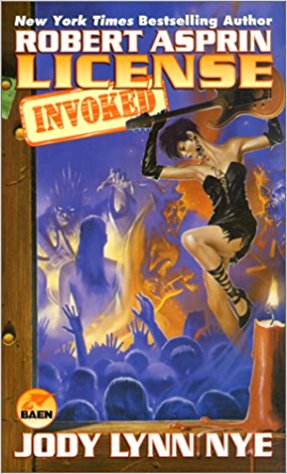 JLN: Same as always. Skeeve is a soft touch to a hard-luck story and has to deal with his shortcomings as an innocent Klahd. Aahz lets people think he’s a heartless, greedy monster, instead of the soft-hearted old grouse we all know him to be. (Notice I didn’t dispute the “greedy” part.) Their friendship will never die. Bunny is now in charge of M.Y.T.H., Inc., which means more organization for the gang. The series will always be full of horrible puns and chapter quotes which, trivia fact, only appear on the head of chapters in which Skeeve is featured. I have had so many people tell me that the books came along when they needed them. The same is true for me. I started reading them during a tough time in college. I want that joy to be there for future readers.
JLN: Same as always. Skeeve is a soft touch to a hard-luck story and has to deal with his shortcomings as an innocent Klahd. Aahz lets people think he’s a heartless, greedy monster, instead of the soft-hearted old grouse we all know him to be. (Notice I didn’t dispute the “greedy” part.) Their friendship will never die. Bunny is now in charge of M.Y.T.H., Inc., which means more organization for the gang. The series will always be full of horrible puns and chapter quotes which, trivia fact, only appear on the head of chapters in which Skeeve is featured. I have had so many people tell me that the books came along when they needed them. The same is true for me. I started reading them during a tough time in college. I want that joy to be there for future readers.
CS: How long will the Myth Adventure series continue and how often will the stories be released?
JLN: I will continue them as long as I can. I’m trying to keep the breezy mood of the earlier volumes such as Little Myth Marker. I’ve got ideas for several more volumes waiting in the wings, more short stories (a couple have been published in anthologies by Kevin J. Anderson’s WordFire Press), and a young adult series. Keep an eye on my website or the Myth-Adventures website for news as I get it.
CS: You’ve done a lot of work with DAW, Baen’s, Ace, Del Rey, and Tor. What type of relationship have you have with these blue chip speculative publishers?
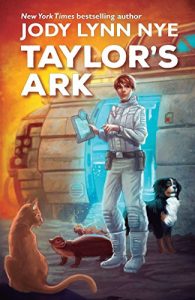 JLN: Cordial, I hope. Baen is my primary publisher. I’ve been with them since 1988 or 1989, and twelve books so far, if you don’t count the omnibuses. Moon Beam will make it thirteen. I love being part of the Baen family. It’s one of the few publishers that encourages their writers to collaborate and intersect on series. I have only done short stories for DAW, but they’re a joy to work with. Ace encouraged me by bringing out my own science fiction series (Taylor’s Ark). Susan Allison had been the series editor for the Myth-Adventures since the beginning, and pleaded with me to continue the Dragons series after Bob died. Del Rey published the Dragonlover’s Guide to Pern. The editor was surprised when we brought her twice the length and twice the number of illustrations she originally requested, but they got behind it in a big way. Tom Doherty of TOR is my hero. Claire Eddy at TOR was my editor on the Crossroads books, and I am still very fond of her. Brian Thomsen edited my fantasy duology, but died before the second volume came out. He had been my editor on my first fantasy books, the Mythology 101 series (no relation to Myth), and I loved him. I’d still be working with him if he was around.
JLN: Cordial, I hope. Baen is my primary publisher. I’ve been with them since 1988 or 1989, and twelve books so far, if you don’t count the omnibuses. Moon Beam will make it thirteen. I love being part of the Baen family. It’s one of the few publishers that encourages their writers to collaborate and intersect on series. I have only done short stories for DAW, but they’re a joy to work with. Ace encouraged me by bringing out my own science fiction series (Taylor’s Ark). Susan Allison had been the series editor for the Myth-Adventures since the beginning, and pleaded with me to continue the Dragons series after Bob died. Del Rey published the Dragonlover’s Guide to Pern. The editor was surprised when we brought her twice the length and twice the number of illustrations she originally requested, but they got behind it in a big way. Tom Doherty of TOR is my hero. Claire Eddy at TOR was my editor on the Crossroads books, and I am still very fond of her. Brian Thomsen edited my fantasy duology, but died before the second volume came out. He had been my editor on my first fantasy books, the Mythology 101 series (no relation to Myth), and I loved him. I’d still be working with him if he was around.
CS: What type of story is Moon Beam?
JLN: Adventure featuring a group of great characters in an exciting setting. Barbara Winton is the newest member of the Bright Sparks, a group of young scientists working on the Moon under the auspices of Dr. Keegan Bright, the host of a daily science broadcast program for kids. Dr. Bright is the Sparks’ mentor, but they come up with the experiments and programs that they want to explore, and they do all the work. In Moon Beam (this is intended as an ongoing series; the second is already being written), the Sparks are building a radio/radar telescope on the far side of the Moon, well away from the light pollution and atmosphere of Earth. If that wasn’t enough of an adventure by itself, a coronal mass ejection, the hard radioactive rays ejected from a sunspot, is heading toward the Sparks, who are trapped days away from rescue, and have to save themselves as one thing after another goes wrong.
CS: Why a young adult series?
JLN: Since my style makes many people already think I write young adult fiction, it seemed like a natural progression. I got into a conversation at a Baen party with Travis Taylor, who actually IS a rocket scientist as well as an author. He, too, had wanted to write YA fiction, but hadn’t made the jump yet. We started throwing ideas back and forth. They gelled beautifully, and I started taking notes. By the party’s end, we had written an outline and proposed it to our publisher, Toni Weisskopf. She didn’t take that particular outline, but we soon adapted it to something she liked.
CS: What’s the STEM connection?
JLN: Young scientists working on the Moon. The subject just begs to be explored.
CS: Why a STEM connection?
JLN: The US is falling far behind other countries in promoting the STEM disciplines, science, technology, engineering and math, to students, particularly female students. Too many kids begin to think that science is too hard, and that there’s no place for them in any program that does anything real or important. They drop away, and we lose brilliant, motivated, interested minds when we should be begging them to share their energy with us. Science can be fun and exciting, and we need young thinkers to be part of our shared future.
CS: How long will the STEM series continue and how often will the stories be released?
JLN: The second one is being written, and we have proposals in for several more. I think that Baen would like to have them out once a year.
CS: What’s Travis Taylor’s connection to the series and connection with you?
JLN: We are collaborators and getting to be friends. We first met at Deep South Con 50 in Huntsville, AL, in 2012, but it wasn’t until LibertyCon the next year, I think, that we had a chance to sit down and talk. (see above)
CS: WordFire, isn’t that Kevin Anderson? What’s it like to work with him?
JLN: I’ve known Kevin since we were all at an awful convention together in 2001. He started WordFire some years later, and did me the honor to invite me to bring out my backlist of out-of-print books through WordFire. He’s been very encouraging. I think it’s been beneficial to both of us. I’m working on a small book for his Million Dollar Productivity series at the moment.
CS: You’ve sold at least 4 stories to Galaxy’s Edge, 3 the same year and one on the horizon. What’s it like to work with Mike Resnick?
JLN: (Correction — our name is usually on the cover because of the book column. I’ve sold three reprints to Mike, but they didn’t all come out in the same year.) Mike’s a national treasure. He has been enormously encouraging to younger writers, including me. He has collaborated with a number of them that he felt could benefit from the attention of being published with him. He calls them his “author daughters.” I’m working on a book with him, too, but I’m waiting to see what title he gives me. Mike created the Stellar Guild series, which pairs “superstars” (his term), including Robert Silverberg, Mercedes Lackey, Harry Turtledove, Kevin J. Anderson, and me, with younger, less experienced writers. The senior author creates a novella, and the junior author writes a prequel or sequel to the main story. I thought it was a wonderful idea. My Stellar Guild book was written with Angelina Adams, a promising new writer whom Todd McCaffrey had been teaching. My husband and I also write the Book Recommendations column for Galaxy’s Edge. So far, Mike seems happy with it.
CS: It’s hard not to notice that all your short fiction is through anthologies. Why not market to periodicals?
JLN: At first, it was blatant cowardice. I sent my first SF story to Stan Schmidt at Analog. He rejected it, but with a full letter telling me that he had seen the plot before, but he really liked my style, and to send him something else. I was only nineteen and had no connection to other SF writers to be reassured how rare and special a thing such a letter was. Instead, I retreated into my shell for several more years. I wrote my first professional short story for David Drake and my husband Bill for The Fleet shared world anthologies. After that, I got on Martin Greenberg’s radar, and wrote at least forty stories for his anthologies. I like the guidance of themed anthologies. The idea creates a frame I can paint in. It turns out that there were three of us who were Marty’s go-to authors when he needed good stories in a hurry, or to fill up a space for a writer who had let him down: me, Esther Friesner, and Nina Kiriki Hoffman. Other editors reached out to me, filling my schedule with terrific ideas I couldn’t wait to explore. Now, it’s probably pure indolence that I don’t write more stories for magazines. I do want to. The more I read the good things that are being published, the more I want to be part of that.
CS: Did I miss anything?
JLN: I’m a big cat fan. My cat Jeremy enjoys a life of quiet luxury. A few of my friends have told me they’d like to come back as one of my cats. I enjoy reading, cooking and baking, travel, photography, and calligraphy. I have found that I really enjoy teaching. I run the two-day intense basic workshop at DragonCon every year.

